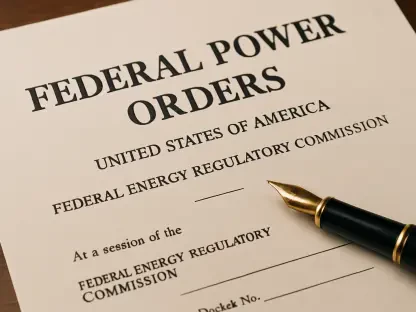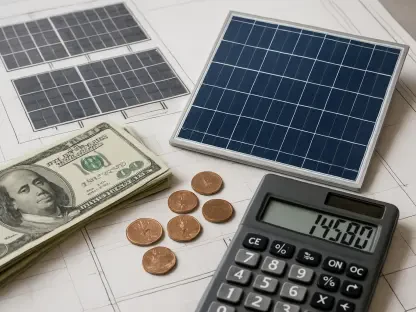Investing in nuclear energy infrastructure presents a multifaceted landscape of economic benefits and challenges. Jack Shaw’s thorough evaluation highlights the potential for substantial economic rewards, including job creation, high tax revenue, market diversity, and niche applications. Despite these potential benefits, Shaw also addresses significant capital and operational costs, as well as the possibility of diverting investments from renewable energy sources. This article aims to provide stakeholders with a balanced perspective to make informed decisions about nuclear power investments.
Positive Economic Implications of Nuclear Energy Investment
Diversification of the Energy Market
Funding nuclear power offers an opportunity to diversify the existing energy market, which can promote long-term industry performance and contribute to economic stability. The current clean electricity market, already a significant economic force, generated $69.4 billion in 2022, marking a 28% growth over the previous year. By investing in nuclear power, this market could experience even greater growth. One of nuclear energy’s most notable advantages is its capability for continuous, around-the-clock power generation without the geographic constraints that often limit renewable sources like wind and solar. This unique feature allows nuclear power to fill performance gaps left by intermittent renewable sources, potentially leading to a more robust and stable clean power market.
Moreover, diversifying the energy market through nuclear investment can make the industry more resilient to fluctuations in fuel prices and supply chain interruptions. This resilience is especially important in an increasingly globalized economy where energy security has become a top priority for nations worldwide. As nuclear power does not rely on fossil fuels, it provides a buffer against volatile oil and gas markets, further contributing to market stability. Additionally, the incorporation of nuclear energy into the clean energy mix could accelerate innovations and efficiency improvements across the entire energy sector, fostering a more dynamic and adaptive industry.
High Tax Revenue Generation
The nuclear sector acts as a substantial revenue stream for national governments, primarily due to the significant tax levies associated with electrical generation. A 2023 study indicated that the nuclear industry currently contributes approximately $7.1 billion in taxes in the UK, with a significant portion of this revenue coming from the northwest region. By expanding the nuclear sector, governments could see increased funding from electrical generation levies and income tax from jobs created within the industry. This additional tax revenue has the potential to fuel economic growth in other sectors or provide essential support to lower and middle-class families, further promoting a healthier overall economy.
Increased tax revenue from the nuclear sector can also help fund public services and infrastructure projects, thereby enhancing the quality of life for citizens. For instance, expanded nuclear investment could enable governments to allocate more resources to healthcare, education, transportation, and social welfare programs. This increased funding from nuclear-related taxes would also allow for greater financial stability and the ability to respond to economic downturns more effectively. In summary, the potential for high tax revenue generation from nuclear energy investments provides a compelling economic incentive for governments to consider expanding their nuclear capabilities.
Job Creation and Economic Boost in Rural Areas
Expanding nuclear energy infrastructure necessitates specialized growth, which in turn creates employment opportunities both in the operation and construction of nuclear facilities. For example, the UK government’s target of generating 24GWs of nuclear power by 2050 could result in the creation of an estimated 80,000 additional jobs across the country. Many of these roles are skilled positions that require specialized training, meaning they often come with comparatively higher wages. This not only contributes to a better standard of living for employees but also fosters economic growth through increased consumer spending and tax contributions.
Importantly, this job growth is particularly significant in rural areas, which often experience lower job and wage growth compared to urban centers. Expanding nuclear infrastructure in these regions can provide essential employment opportunities, thereby boosting local economies that might otherwise struggle. The introduction of high-paying, skilled jobs can also lead to improvements in local infrastructure, education, and healthcare, as increased income generates additional tax revenue for regional governments. By focusing on job creation and economic support in rural areas, nuclear energy investments have the potential to drive comprehensive economic revitalization beyond major cities.
Profitable Investments in Niche Markets
Nuclear energy offers potential for profitable investments in niche markets due to its unique capabilities. For example, certain naval ships use miniature nuclear reactors to generate electricity during extended voyages, and this application could extend to other sectors of the military as well. The military power supply market, projected to be worth $20 billion by 2032, presents a significant opportunity for substantial long-term returns. Similarly, remote projects and heavy industrial use cases stand to benefit greatly from increased nuclear energy investment. By capitalizing on these unique applications, early participants in this niche market can anticipate impressive future returns.
In addition to military and industrial applications, niche markets like medical isotope production and space exploration could also benefit from nuclear energy investments. Medical isotopes are critical for diagnostic imaging and cancer treatment, and nuclear reactors are essential for their production. Investing in nuclear energy could lead to advancements in this field, offering both economic and societal benefits. Furthermore, as space exploration becomes increasingly ambitious, nuclear power could provide a reliable energy source for missions that require long-duration power generation far from the sun. These diverse applications underscore the versatility of nuclear energy and highlight its potential for profitability in various specialized markets.
Challenges of Nuclear Energy Investment
High Capital Costs
One of the primary challenges with nuclear energy investments is the high capital cost associated with building nuclear power plants. While nuclear power plants eventually produce electricity at relatively low costs, the initial investment and construction period are both lengthy and costly. These projects often encounter significant budget overruns and delays, with 97% of studied nuclear projects experiencing such issues. The prohibitive initial expense can deter investors who prefer projects with faster returns on investment.
Additionally, the complex regulatory environment surrounding nuclear power often contributes to extended timelines and increased costs. Stringent safety standards, licensing requirements, and public opposition can lead to prolonged approval processes, adding further financial strain. Investors must be prepared to navigate these regulatory hurdles and account for the associated costs when planning nuclear projects. This complexity contrasts sharply with the relatively straightforward permitting processes for renewable energy projects, making nuclear energy a less attractive option for those seeking quick and predictable returns.
Expensive Operational Costs
Operating nuclear energy infrastructure is also expensive, largely due to the sophisticated technology and high cooling demands of reactors. Although fuel costs are relatively low, other operational expenses represent a significant portion of the total costs. Maintenance and operation account for approximately 66% of total operating costs in modern nuclear power facilities. While newer, more efficient reactors might see reduced costs, the profit margins remain lower compared to some alternatives, presenting a long path to achieving positive returns.
Furthermore, the long-term management of nuclear waste adds to the operational costs. Safely storing and handling radioactive waste requires substantial resources and ongoing oversight, which can strain financial resources. The potential for unforeseen maintenance issues and the need for constant monitoring of safety protocols also contribute to the high operational costs. These factors can create a challenging financial environment for nuclear power plants, requiring careful planning and robust financial strategies to ensure sustainable operations over the plant’s lifetime.
Potential Diversion of Funds from Renewable Energy Projects
Investing in nuclear energy could potentially divert funds away from renewable energy projects. Considering the urgency of combating climate change, prioritizing quicker, more affordable renewable energy projects might be more advantageous. Renewables like wind and solar power, despite being intermittent, achieve profitability faster and with less upfront investment than nuclear power. Some might argue that funding should primarily focus on these alternatives to expedite the transition away from fossil fuels. While nuclear energy is also sustainable, its implementation would take longer, even with increased investment, and thus might not be the optimal short-term solution for the green power transition.
Moreover, the opportunity cost of investing in nuclear energy over renewables must be considered. Allocating significant financial resources to nuclear projects limits the available capital for developing and scaling renewable technologies. This could slow the overall progress toward achieving carbon reduction goals and delay the benefits that come from widespread adoption of renewables. Balancing investments in nuclear energy and renewables is crucial to ensure a comprehensive and effective energy transition, but the potential for fund diversion remains a significant concern.
Strategic Considerations for a Sustainable Energy Future
Balancing Investment Across Multiple Energy Sources
While nuclear energy holds potential as a valuable long-term investment, immediate and more substantial economic growth may come from diversifying funding across multiple types of electrical generation, including renewables. It’s essential to consider nuclear power as part of a broader strategy for a sustainable energy future, rather than the sole focus. This balanced approach can help create jobs, support economic stability, and ensure a more resilient energy market.
By allocating resources to various forms of clean energy, including nuclear, wind, and solar, stakeholders can mitigate risks associated with dependency on a single energy source. Diversification can also lead to synergies between different types of power generation, enhancing overall grid reliability and efficiency. This integrated approach promotes innovation and technological advancements across the energy sector, driving progress towards a fully sustainable and resilient energy future.
Addressing Economic and Environmental Goals
Investing in nuclear energy infrastructure offers a complex array of both economic advantages and challenges. According to Jack Shaw’s comprehensive analysis, the potential economic benefits are substantial, such as the creation of numerous jobs, significant tax revenue generation, market diversification, and specific niche applications. However, Shaw also underscores the sizable capital and operational costs associated with nuclear energy investments. Furthermore, there is the risk of diverting funds away from renewable energy sources, which could negatively impact the broader energy landscape.
This article aims to furnish stakeholders with a balanced viewpoint on nuclear power investments. By weighing these multiple factors, decision-makers can better understand the potential returns against the financial and strategic risks involved. The goal is to help stakeholders make well-informed choices about the viability and strategic fit of nuclear energy within the overall energy portfolio, ensuring that economic gains are maximized without compromising on sustainability or financial responsibility.









